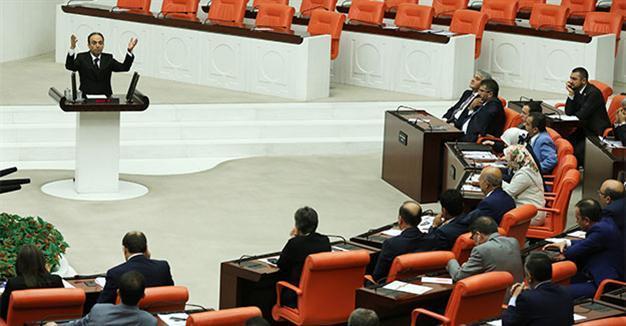HDP’s motion to investigate Ceylanpınar killings rejected
ANKARA

AA photo
A proposal tabled by the Peoples’ Democratic Party (HDP) for a parliamentary investigation into the killing of two police officers in Şanlıurfa’s Ceylanpınar district in July 2015 has been rejected, following fierce debates between HDP deputies and deputies of the ruling Justice and Development Party (AKP).
The attack in which two police officers were killed was “a provocation,” said Kurdish problem-focused HDP Şanlıurfa deputy Osman Baydemir, taking the rostrum to speak on his party’s proposal during a plenary session late on Aug. 17.
“A trap had been set up and this trap had been implemented to the letter. We see that we are faced with a big plot,” Baydemir said.
The killings in Ceylanpınar have widely been seen as triggering the collapse of a ceasefire between the PKK and the Turkish military, which had largely held for almost two years.
“If today we, the political parties with groups at parliament, can illuminate this dark incident, we would then open the door to also uncover the entire functioning of the military coup mechanics,” Baydemir also said.
“If we really don’t want the killings stemming from the conflict to be covered up, then we are in a position to illuminate this incident, which was the spark that restarted the conflict and lit the fuse,” he added.
Levent Gök, the deputy parliamentary group speaker of the main opposition Republican People’s Party (CHP), said at the same session that courage to investigate all dark incidents from Turkey’s past was necessary.
“If we had been able to reveal the truth behind the killing of our two police brothers in Ceylanpınar, perhaps we would have been able to prevent the July 15 [military coup attempt]. The same is true for Suruç,” said Gök, referring to the suicide attack in Suruç in the southeastern province of Şanlıurfa on July 20, 2015, in which 33 young activists were killed.
However, ruling AKP Kahramanmaraş deputy Celalettin Güvenç directly addressed the HDP parliamentary group’s rows, demanding that the PKK lay down its arms.
“Those who want this country to reach real democracy and who believe that the future lies in unity and togetherness should not shout at me. What we expect from you is for Kandil to lay down its arms. If Kandil does not lay down its arms then those sitting in this parliament will be able to come here and say: ‘The era of arms is over. From now on we will do democratic politics,” Güvenç said.
Kandil is a byword for the leadership of the PKK, the headquarters of which are in the Kandil Mountains of northern Iraq.
After Güvenç, Baydemir once again took the rostrum and read out a statement delivered by back in November by Cemil Bayık, a PKK leader based in the Kandil Mountains.
Bayık’s statementIn an interview with the BBC Turkish service in late November, Bayık was asked whether the PKK had launched the Ceylanpınar attack.
“The killing of the two police officers in Ceylanpınar was not related to us,” Bayık said at the time.
“The killing of two police officer in a place where they are sleeping is not our method … Nobody can hold us responsible for the killing of the two police officers in Ceylanpınar,” he added.
Reference controversyDeputy Parliament Speaker Ayşe Nur Bahçekapılı reacted to Baydemir’s reading of Bayık’s statement, warning him to be careful when speaking from “the rostrum of the Republic of Turkey.”
“Are you taking this as a reference? Please be careful about who you are taking a reference from at this rostrum,” Bahçekapılı said.
AKP Deputy Parliamentary Group Chair Mustafa Elitaş then stated that Baydemir had “insulted the TBMM [the Grand National Assembly of Turkey], the Turkish nation and citizens living in the Republic of Turkey.”
In response, HDP Deputy Parliamentary Group Chair Çağlar Demirel recalled that the AKP’s Güvenç had also referred to “statements by the terror organization,” and appealed for the deputy parliament speaker to intervene in this too.
Following the tension in the General Assembly, the HDP’s proposal to investigate the Ceylanpınar killings was rejected by a majority of votes.
